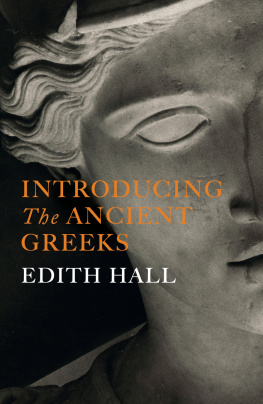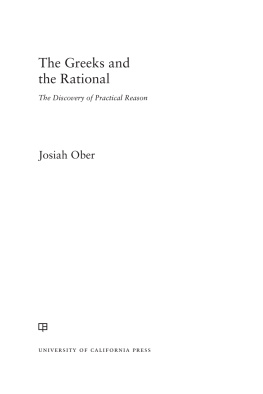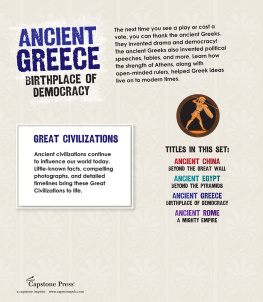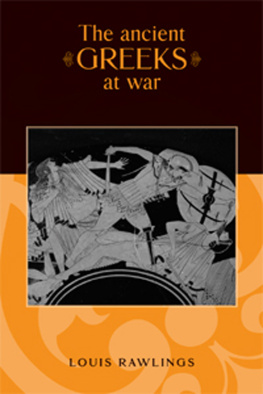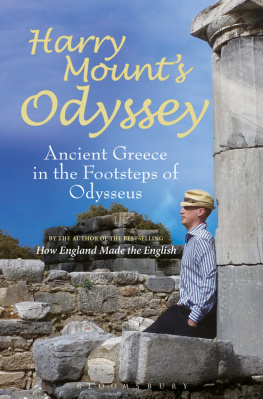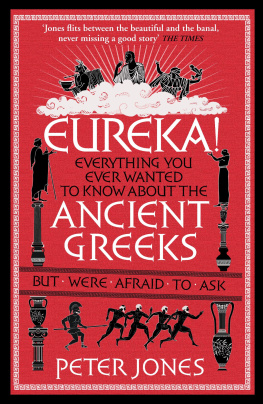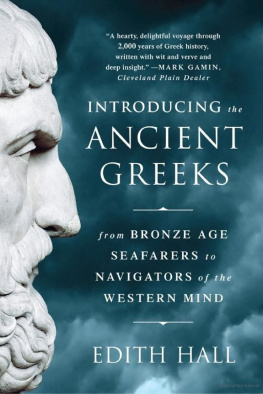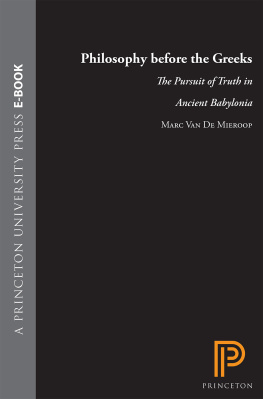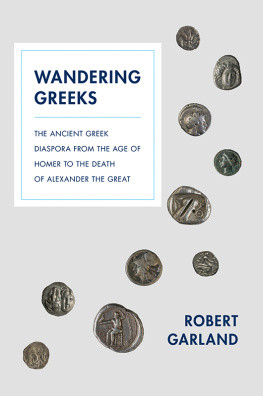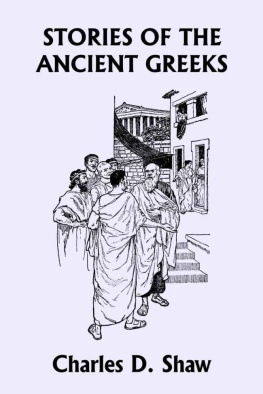Contents
Acknowledgments
I would like to thank Maria Guarnaschelli and Mitchell Kohles at Norton for their enthusiasm for the project and unending patience. Janet Byrne was a superlative copy-editor who improved the book enormously. I would also like to thank Katherine Ailes at Random House for her thoughtful and meticulous editorial work. Paul Cartledges incisive and humorous comments on the whole book proved indispensable, although I have stubbornly not heeded his advice on every single occasion. My father, Stuart Hall, read the last chapter in detail and provided me with invaluable suggestions for improving it. My mother, Brenda Hall, helped me with gathering the data for the maps and timeline. Valeria Vitale designed the maps. R. Ross Holloway and Laura Monros-Gaspar lent generous assistance with tracking down images. Yana Sistovari has been an unfailingly sympathetic and entertaining companion on visits to archaeological sites. My views on the ancient Greeks have developed in lively discussion with students over the last twenty-five years at the universities of Cambridge, Reading, Oxford, Durham, and Royal Holloway and at Kings College, London. I thank them all. But the book could not have been written without the day-to-day support and encouragement of my husband, Richard Poynder, and the humorous commentary of our children, Sarah and Georgia.
About the Author
E DITH H ALL is one of Britains foremost classicists, having held posts at the universities of Royal Holloway, Cambridge, Durham, Reading, and Oxford. She regularly writes in the Times Literary Supplement, reviews theater productions on radio, and has authored and edited more than a dozen works on the ancient world. She teaches at Kings College London and lives in Gloucestershire.
About the Book
Who were the ancient Greeks?
They gave us democracy, philosophy, poetry, rational science, the joke. But what was it that enabled them to achieve so much?
The ancient Greeks were a geographically disparate people whose civilization lasted over twenty centuries and that made us who we are today. And here Edith Hall gives us a revelatory way of viewing this scattered people, identifying ten unique personality traits that she shows to be unique and central to the widespread ancient Greeks.
Hall introduces a people who are inquisitive, articulate and open-minded but also rebellious, individualistic, competitive and hedonistic. They prize excellence above all things but love to laugh. And, central to their identity, they are seafarers whose relationship with the sea underpins every aspect of their society.
Expertly researched and elegantly told, this indispensable introduction unveils a civilization of incomparable richness and a people of astounding complexity.
ALSO BY EDITH HALL
Inventing the Barbarian
The Theatrical Cast of Athens
Cultural Responses to the Persian Wars
The Return of Ulysses
New Directions in Ancient Pantomime
(with Rosie Wyles)
Greek Tragedy
Ancient Slavery and Abolition
Adventures with Iphigenia in Tauris
TRANSLATOR/EDITOR
Medea and Other Plays
(with James Morwood)
Persians
A Note on Sources
I have drawn on the work of many scholars during my research into the ancient Greek world, and some of that work is included in the suggestions for further reading below. The translations from ancient Greek authors are almost all my own, but in a few cases I have used others translations.
On page 94, the description of the riotous symposium at Akragas is by an ancient writer, Athenaeus, and the translation of his Deipnosophistae 2.37 is that of Charles Burton Gulick in the Loeb Classical Library version of Athenaeus, vol. 1 (Cambridge, MA: Harvard University Press, 1927). The metaphors half seas over and ship came in are those of W. J. Slater, in Symposium at Sea, Harvard Studies in Classical Philolog y 80 (1976): 16170.
On page 116, the definition of a philosophical paradox is that of Charles A. Kahn, in The Thesis of Parmenides, Review of Metaphysics 22 (1969): 720. The description of the ancient Mediterranean world as a mosaic of highly individual and distinctive cultures on page 122 is that of Amlie Kuhrt, in Greeks and Greece in Mesopotamian and Persian Perspectives, The Twenty-First J. L. Myres Memorial Lecture (Oxford: Leopards Head Press, 2002), 910. The suggestion on page 138 that the Athenian Council could thus have contained a fair cross-section of the citizen body comes from P. J. Rhodes, The Athenian Boule (Oxford: Oxford University Press, 1985), 4. Paul Cartledge defines the Sparta of the mid-fourth century BC as reduced to the status of a mere Peloponnesian squabbler, which I quote on page 163, in his Agesilaos and the Crisis of Sparta (London: Duckworth, 1986), 3. The description of the hoplites sense of purpose on page 174 is that of Victor Hanson, in The Western Way of War (New York: Knopf, 1989), 220. Larry Tritle considers the possibility that ancient Spartans sometimes suffered from PTSD in Xenophon, Clearchus and PTSD, in Christopher Tuplin, ed., Xenophon and His World (Stuttgart: Franz Steiner Verlag, 2004). Richard Owens praise of Aristotles zoology, quoted on page 195, is from Richard Owen, The Hunterian Lectures in Comparative Anatomy (May and June 1837), edited by Phillip Reid Sloan (Chicago: University of Chicago Press, 1992), 91. The translation of Galen on page 234 is a passage from his treatise On Examinations by Which the Best Physicians Are Recognized. The passage is preserved only in an Arabic version, here reproduced from the English translation of Albert Z. Iskandar, De optimo medico cognoscendo (Berlin: Akademie-Verlag, 1988), 1035. Tessa Rajaks praise of Josephuss readability and appeal, on page 248, is quoted from Josephus, 2nd edition (London: Bristol Classical Press, 2002), 9. G. W. Bowersocks remark about Hellenism on page 250 is quoted from his Hellenism in Late Antiquity (Ann Arbor: University of Michigan Press, 1996), 7.
This ebook is copyright material and must not be copied, reproduced, transferred, distributed, leased, licensed or publicly performed or used in any way except as specifically permitted inwriting by the publishers, as allowed under the terms and conditions under which it was purchased or as strictly permitted by applicable copyright law. Any unauthorised distribution or use of this text may be a direct infringement of the authors and publishers rights and those responsible may be liable in law accordingly.
Epub ISBN: 9781448161621
Version 1.0
www.randomhouse.co.uk
1 3 5 7 9 10 8 6 4 2
Bodley Head, an imprint of Vintage,
20 Vauxhall Bridge Road,
London SW1V 2SA
Bodley Head is part of the Penguin Random House group of companies whose addresses can be found at global.penguinrandomhouse.com.

Copyright Edith Hall 2015
Edith Hall has asserted her right to be identified as the author of this Work in accordance with the Copyright, Designs and Patents Act 1988
First published by Bodley Head in 2015
www.vintage-books.co.uk
A CIP catalogue record for this book is available from the British Library
ISBN 9781847922588
To My Family
As some grave Tyrian trader, from the sea,
Descried at sunrise an emerging prow
Lifting the cool-haird creepers stealthily,
The fringes of a southward-facing brow
Among the Aegean isles;
And saw the merry Grecian coaster come,
Next page
